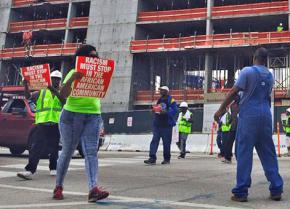We need real jobs on the South Side
reports on a demonstration of African American construction workers demanding jobs at the University of Chicago in the city's South Side.
THE UNIVERSITY of Chicago, which has already faced several weeks of sustained protest over its refusal to open an adult trauma center desperately needed by Black residents of Chicago's South Side, was picketed on June 22 by dozens of Black construction workers demanding jobs as the university continues work on a new residence hall and dining commons.
The picket, which impeded regular traffic along the busy 55th Street corridor for several hours, was organized by the African American Contractors Association (AACA), but mostly attended by workers, not contractors.
Despite the university's location in the majority Black South Side, few workers on the job site are Black. This, the workers charge, is just the latest in a longstanding pattern of racist discrimination in hiring practices by the university. "There's a long pattern of racial discrimination from the university," said AACA President Omar Shareef. "They don't want us to participate in the building of the university--even when Michelle Obama was the spokesperson for the Comer Hospital project. They'll put her out to do PR, but they didn't have any Black people on the job."

Or as construction worker Larry Ziff called out from the bullhorn, evoking the image of Eric Garner, who was killed by New York police when they stopped him for selling cigarettes: "We've got loose cigarette jobs. We need real jobs. We need to make $4,500 a week like the workers in there."
Additionally, construction worker Joseph Watkins said that management on the worksite was pitting the few Black workers who are employed on the job against those picketing outside the gates. "The University of Chicago is one of the most racist institutions in this city," he said. "And they're keeping us divided."
The battle over employment at the new residence hall is setting the stage for a larger battle: Who will build the Obama Library, which the University of Chicago won after a long bidding war? "When they build the Obama Library, we won't be on that job either," said Ziff.
NOT ONLY do Black construction workers worry that they will be excluded from employment as the city builds a library for the first Black president, but like so many other construction projects, the university has rolled over the Black working class that remains in Hyde Park and the nearby neighborhoods of Washington Park and Woodlawn.
Additionally, Ziff and Watkins both highlighted the failure of Democratic Party leaders. As Ziff called out to the picketers, "When the politicians come and ask you to vote for them, remember this day. When Hillary comes asking for your vote, remember that Obama asked for your vote, too. We can't keep voting for the Democrats when we're starving." Watkins said:
The residents got no input in the Obama Library. It's the same old racist ploy: They don't involve us in decision-making, they don't give us funding for the programs we need. They go to someone who will rubber-stamp what they do and then say that the Black community approved it. But they need to stop going to the Jesse Jacksons, because they don't represent us.
But the dispute isn't just about one worksite, or a pattern of discrimination at construction sites around the university. There are much bigger political issues at stake, and the workers who faced police harassment and some hostility from traffic knew it. Most were residents of Hyde Park, the neighborhood where the University of Chicago is located or the immediate vicinity, and noted that discrimination for good-paying construction jobs was part of a larger attack on Black workers in the neighborhood, an attack that centers around displacement, gentrification and racist policing.
"They're using their racist powers to gentrify us out of this neighborhood," said Joseph Watkins. "They discriminate purposefully so they can keep us in a permanent underclass."
The University of Chicago has long bought up properties in the neighborhood, turning Hyde Park essentially into a company town. Shareef recalled that when he was growing up in Hyde Park, it used to be much more diverse. "But now they've drawn these invisible lines of racism, and they sit up on their snow-capped tower and don't reach out to African Americans except to go out of their way to exclude us and take our land."
Watkins pointed to the Harper Court development, a huge building in the heart of Hyde Park that the university sold to the Clal Group--a conglomerate that supplies concrete for Israel's apartheid wall. "That could have been a community center," he said. "The community, the campus and workers alike could have benefited from it." Instead, it's now a heavily police Chipotle restaurant.
Students, campus unions and community members must demand the university employ more Black workers and give the Black residents of the South Side meaningful decision making power over the future of their communities. The university is racist to its core: enrolling a disproportionately low number of Black students, denying South Siders an adult trauma center, discriminating against Black workers, displacing Black residents and terrorizing them with a private police force.
If we want to make Black lives matter at the University of Chicago, we need to make sure Black work matters, too.


